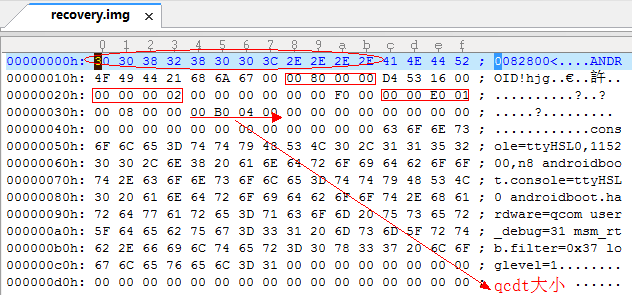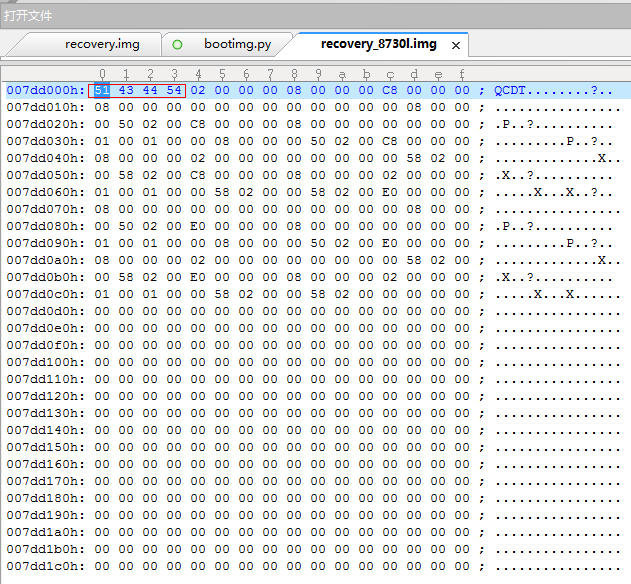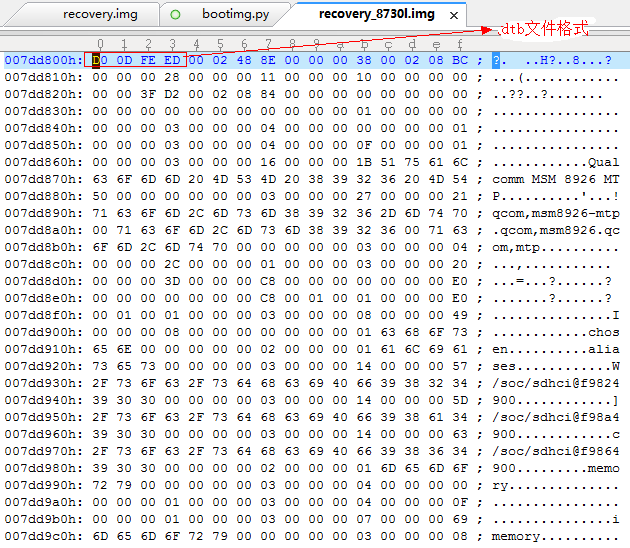酷派CPB升级文件中的recovery.img(qcdt校验)
CPB解包:http://my.oschina.net/u/570986/blog/352839
用的cpbtool工具解包4.3.066.P3.140417.8730L.CPB文件,得到下列文件:
8626_msimage.mbn
boot.img
cache.img
dt.img
dummy.bin
efs1.bin
efs2.bin
efs3.bin
efs_image_meta.bin
emmc_appsboot.mbn
mba.mbn
mcfg_hw.mbn
mcfg_sw.mbn
MISC.img
MPRG8626.mbn
NON-HLOS.bin
nv.tar.mbn
panic.img
persist.img
PhoneInfo.yl
qdsp6sw.mbn
recovery.img
rpm.mbn
sbl1.mbn
sdi.mbn
system.img
tz.mbn
userdata.img
上面的解压出来的img文件与平常的img不同。boot.img和recovery.img不能用bootimg.exe解包(这是个别人用python写的,下载》这里)。以recovery.img为例:
前头填充了12字节,目前不知道什么用途。去掉这12字节后,用bootimg.exe还是不能解开,会提示“invalid bootimg”的错误。原因在于bootimg.exe工具还校验了ramdisk_addr、second_addr、tags_addr。
boot.img和recovery.img文件头格式如下:
#define BOOT_MAGIC "ANDROID!"
#define BOOT_MAGIC_SIZE 8
#define BOOT_NAME_SIZE 16
#define BOOT_ARGS_SIZE 512
struct boot_img_hdr
{
unsigned char magic[BOOT_MAGIC_SIZE];
unsigned kernel_size; /* size in bytes */
unsigned kernel_addr; /* physical load addr */
unsigned ramdisk_size; /* size in bytes */
unsigned ramdisk_addr; /* physical load addr */
unsigned second_size; /* size in bytes */
unsigned second_addr; /* physical load addr */
unsigned tags_addr; /* physical addr for kernel tags */
unsigned page_size; /* flash page size we assume */
unsigned unused[2]; /* future expansion: should be 0 */
unsigned char name[BOOT_NAME_SIZE]; /* asciiz product name */
unsigned char cmdline[BOOT_ARGS_SIZE];
unsigned id[8]; /* timestamp / checksum / sha1 / etc */
};
bootimg.exe的python源码文件校验地址部分代码:
base = kernel_addr - 0x00008000
assert magic.decode('latin') == 'ANDROID!', 'invald bootimg'
assert base == ramdisk_addr - 0x01000000, 'invalid bootimg'
assert base == second_addr - 0x00f00000, 'invalid bootimg'
assert base == tags_addr - 0x00000100, 'invalid bootimg'
修正这些地址域后就可以用bootimg.exe解开。但是bootimg.exe解开的并不完整, 4.3.066.P3.140417.8730L.CPB解开来的recovery.img还有一个qcdt节。猜测应该是qualcomm device tree节简称,高通cpu设备树。
qcdt节:
qcdt节下包含了两个dtb:
从qcdt节开始到文件结束都属于qcdt节的部分。因此封包程序不能用bootimg.exe封包成recovery.img,况且bootimg.exe封包并不会填充boot_img_hdr头的unsigned id[8];域,此域保存的是SHA1值。自己改的封包工具主要代码如下:
/* tools/mkbootimg/mkbootimg.c
**
** Copyright 2007, The Android Open Source Project
**
** Licensed under the Apache License, Version 2.0 (the "License");
** you may not use this file except in compliance with the License.
** You may obtain a copy of the License at
**
** http://www.apache.org/licenses/LICENSE-2.0
**
** Unless required by applicable law or agreed to in writing, software
** distributed under the License is distributed on an "AS IS" BASIS,
** WITHOUT WARRANTIES OR CONDITIONS OF ANY KIND, either express or implied.
** See the License for the specific language governing permissions and
** limitations under the License.
*/
#include <stdio.h>
#include <stdlib.h>
#include <string.h>
//#include <unistd.h>
#include <fcntl.h>
#include <errno.h>
#include <io.h>
#include "sha.c"
#include "bootimg.h"
static void *load_file(const char *fn, unsigned *_sz)
{
char *data;
int sz, ret;
int fd;
data = 0;
fd = open(fn, O_RDONLY | _O_BINARY);
if (fd < 0) return 0;
sz = lseek(fd, 0, SEEK_END);
if (sz < 0) goto oops;
if (lseek(fd, 0, SEEK_SET) != 0) goto oops;
data = (char*) malloc(sz);
if (data == 0)
{
printf("malloc fail! File '%s' size: 0x%.8X(%u).\n", fn, sz, sz) ;
goto oops;
}
ret = read(fd, data, sz) ;
if (ret != sz)
{
printf("read error: %d! File '%s'.\n", ret, fn) ;
goto oops;
}
close(fd);
if (_sz) *_sz = sz;
return data;
oops:
close(fd);
if (data != 0) free(data);
return 0;
}
int usage(void)
{
fprintf(stderr,"usage: mkbootimg\n"
" --kernel <filename>\n"
" --ramdisk <filename>\n"
" [ --second <2ndbootloader-filename> ]\n"
" [ --qcdt <qualcomm-bin-device-tree-filename> ]\n"
" [ --cmdline <kernel-commandline> ]\n"
" [ --board <boardname> ]\n"
" [ --base <address> ]\n"
" [ --pagesize <pagesize> ]\n"
" -o|--output <filename>\n"
);
return 1;
}
static unsigned char padding[4096] = { 0, };
int write_padding(int fd, unsigned pagesize, unsigned itemsize)
{
unsigned pagemask = pagesize - 1;
unsigned count;
if ((itemsize & pagemask) == 0)
{
return 0;
}
count = pagesize - (itemsize & pagemask);
if (write(fd, padding, count) != count)
{
return -1;
}
else
{
return 0;
}
}
int main(int argc, char **argv)
{
boot_img_hdr hdr;
char *kernel_fn = 0;
void *kernel_data = 0;
char *ramdisk_fn = 0;
void *ramdisk_data = 0;
char *second_fn = 0;
void *second_data = 0;
char *qcdt_fn = NULL ;
void *qcdt_data = NULL ;
char *cmdline = "";
char *bootimg = 0;
char *board = "";
unsigned pagesize = 2048;
int fd;
SHA_CTX ctx;
uint8_t* sha;
unsigned uiQcdtSize = 0 ;
argc--;
argv++;
if (argc == 0)
return usage() ;
memset(&hdr, 0, sizeof(hdr));
/* default load addresses */
hdr.kernel_addr = 0x10008000;
hdr.ramdisk_addr = 0x11000000;
hdr.second_addr = 0x10F00000;
hdr.tags_addr = 0x10000100;
while (argc > 0)
{
char *arg = argv[0];
char *val = argv[1];
if (argc < 2)
{
return usage();
}
argc -= 2;
argv += 2;
if (!strcmp(arg, "--output") || !strcmp(arg, "-o"))
{
bootimg = val;
}
else if (!strcmp(arg, "--kernel"))
{
kernel_fn = val;
}
else if (!strcmp(arg, "--ramdisk"))
{
ramdisk_fn = val;
}
else if (!strcmp(arg, "--second"))
{
second_fn = val;
}
else if (!strcmp(arg, "--qcdt"))
{
qcdt_fn = val ;
}
else if (!strcmp(arg, "--cmdline"))
{
cmdline = val;
}
else if (!strcmp(arg, "--base"))
{
unsigned base = strtoul(val, 0, 16);
hdr.kernel_addr = base + 0x00008000;
hdr.ramdisk_addr = base + 0x01000000;
hdr.second_addr = base + 0x00F00000;
hdr.tags_addr = base + 0x00000100;
}
else if (!strcmp(arg, "--board"))
{
board = val;
}
else if (!strcmp(arg,"--pagesize"))
{
pagesize = strtoul(val, 0, 10);
if ((pagesize != 2048) && (pagesize != 4096))
{
fprintf(stderr,"error: unsupported page size %d\n", pagesize);
return -1;
}
}
else
{
return usage();
}
}
hdr.page_size = pagesize;
if (bootimg == 0)
{
fprintf(stderr,"error: no output filename specified\n");
return usage();
}
if (kernel_fn == 0)
{
fprintf(stderr,"error: no kernel image specified\n");
return usage();
}
if (ramdisk_fn == 0)
{
fprintf(stderr,"error: no ramdisk image specified\n");
return usage();
}
if (strlen(board) >= BOOT_NAME_SIZE)
{
fprintf(stderr,"error: board name too large\n");
return usage();
}
strcpy(hdr.name, board);
memcpy(hdr.magic, BOOT_MAGIC, BOOT_MAGIC_SIZE);
if (strlen(cmdline) > (BOOT_ARGS_SIZE - 1))
{
fprintf(stderr,"error: kernel commandline too large\n");
return 1;
}
strcpy((char*)hdr.cmdline, cmdline);
kernel_data = load_file(kernel_fn, &hdr.kernel_size);
if (kernel_data == 0)
{
fprintf(stderr,"error: could not load kernel '%s'\n", kernel_fn);
return 1;
}
if (!strcmp(ramdisk_fn,"NONE"))
{
ramdisk_data = 0;
hdr.ramdisk_size = 0;
}
else
{
ramdisk_data = load_file(ramdisk_fn, &hdr.ramdisk_size);
if (ramdisk_data == 0)
{
fprintf(stderr,"error: could not load ramdisk '%s'\n", ramdisk_fn);
return 1;
}
}
if (second_fn)
{
second_data = load_file(second_fn, &hdr.second_size);
if (second_data == 0)
{
fprintf(stderr,"error: could not load secondstage '%s'\n", second_fn);
return 1;
}
}
if (qcdt_fn)
{
qcdt_data = load_file(qcdt_fn, &uiQcdtSize);
if (qcdt_data == 0)
{
fprintf(stderr,"error: could not load qualcomm binary device tree '%s'\n", qcdt_fn);
return 1;
}
}
/* put a hash of the contents in the header so boot images can be
* differentiated based on their first 2k.
*/
SHA_init(&ctx);
SHA_update(&ctx, kernel_data, hdr.kernel_size);
SHA_update(&ctx, &hdr.kernel_size, sizeof(hdr.kernel_size));
SHA_update(&ctx, ramdisk_data, hdr.ramdisk_size);
SHA_update(&ctx, &hdr.ramdisk_size, sizeof(hdr.ramdisk_size));
SHA_update(&ctx, second_data, hdr.second_size);
SHA_update(&ctx, &hdr.second_size, sizeof(hdr.second_size));
if (qcdt_fn)
{
SHA_update(&ctx, qcdt_data, uiQcdtSize);
SHA_update(&ctx, &uiQcdtSize, sizeof(uiQcdtSize));
//
hdr.unused[0] = uiQcdtSize ;
}
sha = SHA_final(&ctx);
memcpy(hdr.id, sha,
SHA_DIGEST_SIZE > sizeof(hdr.id) ? sizeof(hdr.id) : SHA_DIGEST_SIZE);
fd = open(bootimg, O_CREAT | O_TRUNC | O_WRONLY | _O_BINARY, 0644);
if (fd < 0)
{
fprintf(stderr,"error: could not create '%s'\n", bootimg);
return 1;
}
if (write(fd, &hdr, sizeof(hdr)) != sizeof(hdr)) goto fail;
if (write_padding(fd, pagesize, sizeof(hdr))) goto fail;
if (write(fd, kernel_data, hdr.kernel_size) != hdr.kernel_size) goto fail;
if (write_padding(fd, pagesize, hdr.kernel_size)) goto fail;
if (write(fd, ramdisk_data, hdr.ramdisk_size) != hdr.ramdisk_size) goto fail;
if (write_padding(fd, pagesize, hdr.ramdisk_size)) goto fail;
if (second_data)
{
if (write(fd, second_data, hdr.second_size) != hdr.second_size) goto fail;
if (write_padding(fd, pagesize, hdr.ramdisk_size)) goto fail;
}
if (qcdt_data)
{
if (write(fd, qcdt_data, uiQcdtSize) != uiQcdtSize) goto fail;
if (write_padding(fd, pagesize, uiQcdtSize)) goto fail;
}
free(kernel_data) ;
free(ramdisk_data) ;
free(second_data) ;
free(qcdt_data) ;
return 0;
fail:
free(kernel_data) ;
free(ramdisk_data) ;
free(second_data) ;
free(qcdt_data) ;
unlink(bootimg);
close(fd);
fprintf(stderr,"error: failed writing '%s': %s\n", bootimg,
strerror(errno));
return 1;
}
完整的代码》这里下载



